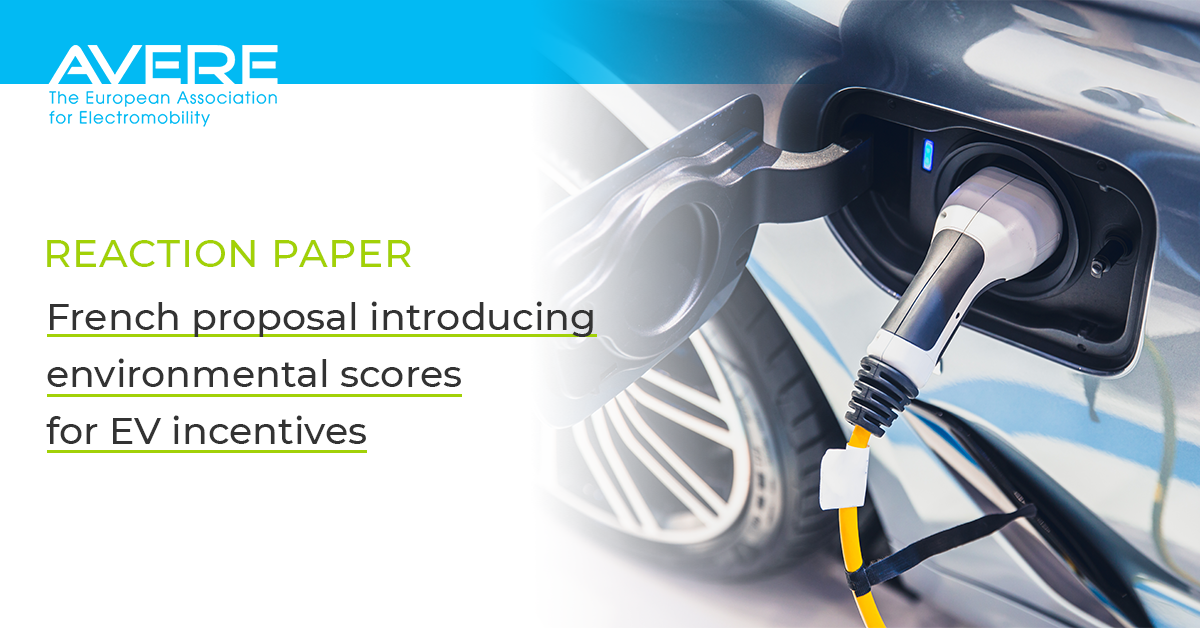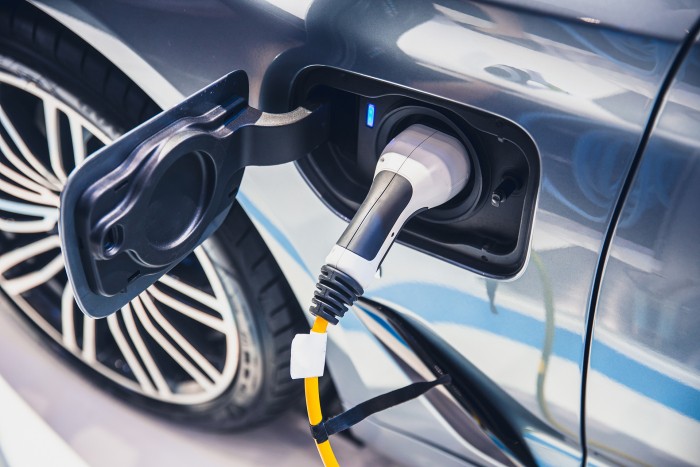
AVERE, the European Association for Electromobility, takes note of the French government’s proposal to modify the ecological bonus for new electric passenger cars on achievement of a minimum environmental score (“bonus écologique pour les voitures particulières neuves électriques à l’atteinte d'un score environnemental minimal”) but is concerned that such a proposal could create incoherency with EU legislations and slow down the transition to zero-emission vehicles.
REACTION PAPER
on the French proposal introducing environmental scores" for EV incentives

AVERE, the European Association for Electromobility, takes note of the French government’s proposal to modify the ecological bonus for new electric passenger cars on achievement of a minimum environmental score (“bonus écologique pour les voitures particulières neuves électriques à l’atteinte d'un score environnemental minimal”) but is concerned that such a proposal could create incoherency with EU legislations and slow down the transition to zero-emission vehicles.
1. Ensure national incentives are in line with EU legislations and adopted methodologies
The draft proposal put forward by the French government proposes to allocate Electric Vehicles (EV) purchase incentives based on the achievement of a minimum environmental score. While AVERE supports the objectives of ensuring vehicles are the most environmentally friendly across their entire life-cycle, we are concerned that the calculation methodology proposed in the draft legislation is weak and conflicts with many existing rules and methodologies established in adopted EU legislations.
Indeed, the suggested methodology calls for the EV environmental score to follow the calculation below, with each individual score having a calculation methodology of its own:
Score = Steel score + Aluminum score + Other materials score + Battery score + Assembly score + Transport score
AVERE worries that this proposed methodology would be in conflict with the following legislations aiming at taking into account and limiting the carbon footprints of products found in EVs:
- The adopted Regulation on Batteries and Waste Batteries[1] which introduces calculation and monitoring of the entire life cycle of electric vehicle batteries as well as Recycling obligations for battery materials.
- The adopted Carbon Border Adjustment Mechanism (CBAM)[2] which will progressively introduce a carbon tax on imports of steel and aluminium based on their carbon footprint but will also ensure the carbon content per production site for steel and aluminium imported into the European Union is transmitted by the operators.
- The ongoing Circular Vehicles Regulation[3] which sets circularity targets for vehicles and their components which will be translated into new recycling, recovery, reuse and repairability obligations.
- The Critical Raw Materials Act[4] with the objective of establishing sustainable supply chains for rare materials.
- The Corporate Sustainability Reporting Directive (CSRD)[5] which will ensure new reporting requirements (including climate, pollution, biodiversity and ecosystems, resource use and the circular economy) are published
- The Corporate Sustainability Due Diligence Directive (CSDD)[6] suggesting new obligations to oversee the supply chain in order to take into account human rights and environmental impact of companies
Any national incentives that fail to take account of existing EU methodologies when developing their incentive mechanisms risk fragmenting EU efforts to standardize carbon footprint methodologies and may have counterproductive effects in establishing accurate and comparable carbon emission data.
We therefore call on the European Commission to ensure that the methods used to calculate the carbon footprint under national incentives mechanisms comply with the standards and methodologies adopted by the EU and do not lead to fragmentation of the European single market.
2. Ensure vehicles are not competing unfairly due to their geographical production

In addition, the French draft incentive proposal jeopardizes the principle of free trade which forms the basis of the European Union's economic policy. Indeed, the proposal suggests putting certain geographical areas at risk of competitive disadvantage by weighting the carbon content globally by vehicle version and not in relation to deliveries made in France. This limits the potential sales of vehicles produced outside the EU to participate in the decarbonization of European road transport and thus help the EU achieve its climate objectives.
Incentives should be aimed at encouraging the market penetration of electric vehicles, and should not create too many conditionalities that erect barriers to entry for many players in this field. The environmental optimum of a version should be producing and sell vehicles nearby but not prevent vehicles from being produced and sold in some countries.
AVERE calls on the European Commission to ensure national incentives are compliant with free trade principles and do not create non-tariff barriers. Additionally, environmental scores should focus on vehicles sold on domestic markets and not on the global production of a version.
3. Ensure incentives support the transition to zero-emission mobility
AVERE must point out that the current draft on the table could have counterproductive effects on the sales of new electric vehicles in France and slow down the transition to zero-emission road transport.
Indeed, the current draft and proposed carbon footprint calculation methodology could make EVs perceived as equally polluting as internal combustion engines counterparts.
Lastly, the draft calculation methodology penalises heavier batteries when these batteries could be the ones best fitted to the best-selling versions of a vehicle. Such a proposal could slow down the transition of fleets to zero-emission. AVERE therefore calls for calculation closer to the market reality which takes into account heavier batteries.
4. Ensure a proper impact assessment is conducted
Finally, AVERE would like to highlight the lack of an impact study for the measures proposed by the French government, which could have disastrous effects if implemented according to the planned timetable, i.e. January 2024. Indeed, many car manufacturers point out that such a revision of the incentive system could have an industrial impact that could delay deliveries of electric vehicles. The administrative procedure, in particular collecting the data needed to calculate the environmental score, is rather difficult to implement in such a short timeframe and might put certain EVs at risk of not benefitting from the new incentive scheme.
In addition, we have some concerns about the ability of the French administration, and in particular the French Agency for Ecological Transition (ADEME), to manage the large number of files to be processed before this new incentive system comes into force in 2024. At present, there is no online platform to manage the influx of files, the final text has not yet been approved and manufacturers' data has not yet been collected. It is essential that the French administration is ready to collect and process all the relevant information, otherwise this could create uncertainty about the eligibility of incentives and slow down the registration of electric vehicles in France.
